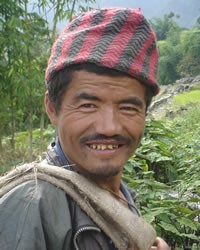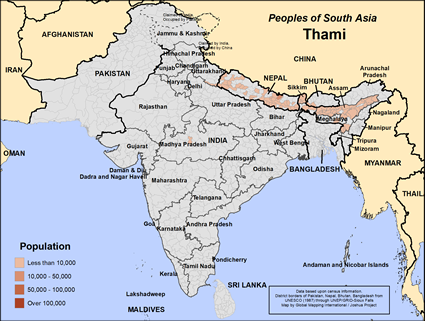Thami in Nepal

Photo Source:
Anonymous
|

Map Source:
People Group data: Omid. Map geography: UNESCO / GMI. Map Design: Joshua Project.
|
| People Name: | Thami |
| Country: | Nepal |
| 10/40 Window: | Yes |
| Population: | 30,000 |
| World Population: | 33,700 |
| Primary Language: | Thangmi |
| Primary Religion: | Hinduism |
| Christian Adherents: | 0.87 % |
| Evangelicals: | 0.00 % |
| Scripture: | New Testament |
| Ministry Resources: | No |
| Jesus Film: | Yes |
| Audio Recordings: | Yes |
| People Cluster: | South Asia Hindu - other |
| Affinity Bloc: | South Asian Peoples |
| Progress Level: |
|
Introduction / History
The Thami were originally a nomadic tribe that settled just to the east of Katmandu, Nepal's capital. Legend says that the first Thami couple had seven sons and seven daughters. When the parents could not find suitable marriage partners for their children, they allowed them to intermarry. The Thami tribes are their descendants.
The physical characteristics and overall customs of the Thami lead many to believe that they are of Mongolian descent. Their native language, Thangmi, is a Tibeto-Burman language. Thangmi is usually spoken at home, but Nepali is used in outside communication. They have no written script.
Most of the Thami people live either in India or Nepal, but a smaller number are in China. In Nepal they live in the districts of Dolakha and Sindhupalchowk.
What Are Their Lives Like?
The Thami are hard-working and extremely honest but are often easily exploited by neighboring peoples. They are looked down upon; some try to pass themselves as members of other ethnic groups. There are recent efforts to promote Thami art as a way to give them better social standing.
The Thami scarcely manage to survive as farmers or stone quarry workers. Often the men have to carry large heavy stones great distances to make a living. To escape from this hardship, many have traveled to find other work. Their economic conditions are very poor, but the Thami do not seem to be anxious about their circumstances. In fact, they are often willing to go into debt to hold a feast or a celebration.
Their staple diet is fish and dhendo, a mush made of millet or maize flour. They often consume a lot of alcohol and eat the meat of goats, foul, ducks and cows. Still, many people suffer from malnutrition.
They consider marriage to be a very sacred institution. They believe in staying faithful to one partner until death. When a young man desires to marry, a go-between, called a lami, goes to the girl's house with three roti (bread) and two other people. If the lami is received, the bread is placed in front of the girl and her parents. If they accept the bread as a gift, talks proceed and the marriage is arranged. If the gift does not accept the proposal, the lami hides the bag in her house and reports the failure of the negotiations to the man. Three days after a child is born, the floor of the house is cleaned with a mixture of cow dung and water. Both the house and people are sprinkled with cow urine in order to purify them. The child's wrists, waist, and ankles are tied with threads wet with turmeric (yellow dye made from a plant grown in this region). The threads must go around seven times before being tied. The child is then given a name according to the day on which he/she was born. The child's maternal family then feasts on fish, lentils, meat, vegetables, and alcoholic beverages. A large rooster is also sacrificed for the celebration.
What Are Their Beliefs?
A majority of the Thami practice ethnic religions and shamanism. They worship deities that are not in any of the major religions of the region. They tend to lean toward Buddhism but use many of the Hindu rituals in their marriage ceremonies. In sum, their religious beliefs do not fall into any neat category. There are some Christian believers among them, but they lack a sustainable movement to Christ.
What Are Their Needs?
In order to rise above their current situation, the Thami people need better education and job opportunities.
Prayer Points
Pray that the Lord of the harvest will thrust forth Holy Spirit anointed laborers into Thami communities.
Ask the Holy Spirit to stir up hunger within the hearts of the Thami to know the one true God.
Pray for an unstoppable Disciple Making Movement among the Thami people this decade.